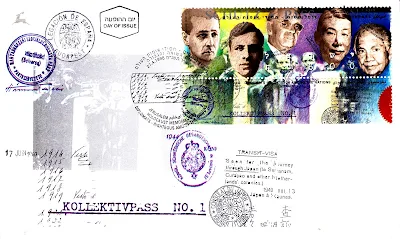When asked why he did it, Italian-born Giorgio Perlasca who became the Spanish chargé d’affaires in Budapest said simply: “Because I could not bear the sight of people branded as animals. Because I couldn’t bear to see children killed. I think it was this. I don’t think I was a hero.”
Dr. Aristides de Sousa Mendes
By issuing visas to Jewish refugees, some were acting contrary to the explicit orders of their governments and superiors. Doing this put them at direct risk to their careers and, in some cases, even their lives. After issuing thousands of visas to Jewish and other refugees in Bordeaux, France, in June 1940, Portuguese Consul General Aristides de Sousa Mendes explained: “My government has denied all applications for visas to any refugee. But I cannot allow these people to die..I am going to issue [a visa] to anyone who asks for it...Even if I am discharged I can only act as a Christian, as my conscience tells me.”
Carl Lutz
Swiss Vice Consul Carl Lutz led the "largest diplomatic rescue operation of World War II," according to historian Xavier Cornut, president of the Society for Swiss History, which studies the subject. He represented the interests of not only Switzerland but countries that had severed diplomatic relations with Hungary, including the United States and Great Britain. Unwilling to abandon the fate of hundreds of Jews crowding daily in front of the Swiss legation, he developed letters of protection, using the 7,800 certificates received from Great Britain for emigration to Palestine. The letters of protection, always numbered from 1 to 7,800, were distributed to prevent the deportation.
Another feat was to extend diplomatic protection to 76 buildings in Budapest where Jews were housed, fed and supported. The Jewish Council for Palestine, now the "Emigration Department of the Swiss Legation," was located at 29 Vadasz Utca, in the "Glass House," which now houses a small museum. His life was also shaken on a personal level by the meeting with Magda Grausz, who had come to ask him for protection for herself and her daughter Agnes, and whom he would employ in his residence. He would marry her in 1949.
Until the fall of 1944, when the fascist Arrow Cross Party took power, Carl Lutz worked with the support of his then wife Gertrud. He even hid Jews in his black Packard and participated in the columns forced to march to the Austrian border. In total, more than half a million Hungarian Jews perished, 120,000 survived. The Swiss action, headed by Carl Lutz, helped save several tens of thousands of men, women and children.
He was nominated several times for the Nobel Peace Prize and in 1964 became the first Swiss to be recognized as Righteous Among the Nations. He died in Bern on February 13, 1975.
Chiune Sugihara
The Japanese Consul, Chiune Sugihara, who saved Jews in Kovno, Lithuania, said: “Those people told me the kind of horror they would have to face if they didn’t get away from the Nazis and I believe them. There was no place else for them to go....If I had waited any longer, even if permission came, it might have been too late.”
Selahattin Ülkumen
Turkish and Greek Jews were deported to death camps from the island of Corfu. But on the island of Rhodes, Turkey’s Consul, Selahattin Ülkümen, saved the lives of up to 50 people, among a Jewish community of some 2,000 after the Germans took over the island. Turkish diplomat Selahattin Ülkümen is once said to have responded: “All that I did was follow my obligations as a human being.”
After more than 60 years, some 347 diplomats have been identified and honoured in the exhibit have yet to be recognised or rehabilitated in their own countries. In the years after the war, many diplomats and their families suffered retribution and economic hardship for their courageous actions.

No comments:
Post a Comment